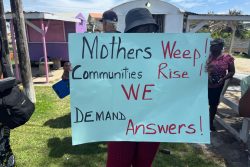Guyanese are reminded that there is an urgent need to conserve on water, in view of the low level of the Lamaha Canal owing to the prolonged dry season, as the world marks World Water Day today.
In a joint statement issued in observance of World Water Day, Guyana Water Incorporated and WWF highlighted the challenge being faced with regard to freshwater conservation around the world.
And Director General of DG Development of the European Commission Stefano Manservisi, in a message to mark the day, cited the 2006 Human Development Report published last November, which said: “the world faces a water crisis that, left unchecked, will derail progress towards achieving the Millennium Development Goals.”
The WWF/GWI statement said this year’s theme ‘Coping with Water Scarcity’ is timely in the light of recent events.
The statement said while there is a relative abundance of surface water during the rainy season, this water needs to be treated before it can be termed potable. “This treatment process involves the use of costly resources such as electricity, chemicals and personnel so treated water should not be wasted but conserved. Whenever we use more water than we need around the house, we are wasting a precious resource, including money and energy and are generating excessive amounts of wastewater.”
It is imperative that all Guyanese recognise that while we dwell in “the land of many waters”, the supply of “freshwater” in Guyana and around the world is significantly limited, the joint statement said.
It noted that only about three percent of the Earth’s water is freshwater and about two percent of this is in solid form in ice caps and glaciers, which leaves just about one percent available for use. This limited supply of freshwater, as well as the threat of global warming, begs for a united effort to conserve on water and Guyanese are urged to begin this at home by, for example, avoiding tasks such as washing concrete surfaces with water and using a broom or a brush instead.
Meanwhile, Manservisi’s message said water resource management, water supply and sanitation continue as priority areas in the EU’s national and regional development assistance programmes. The ACP-EU Water Facility has led to the selection of 175 proposals, from over 1300 submitted, which are estimated to bring access to water to about 20 million people and sanitation to about nine million people over the next four years. And it is set to launch the EU-Africa Partnership on Infrastructure which has as its focus regional infrastructure, including water infrastructure.
Most countries in the Near East and North Africa suffer from water scarcity, as do countries such as Mexico, Pakistan, Southern Africa, and large parts of China and India. Projections for 2025 indicate that the number of people living in water-stressed countries will increase to three billion – a six-fold increase. Given current population projections, over 400 million people are expected to be living in at least 17 water-scarce African countries by the year 2010. This lack of water threatens to constrain food production, ecosystem protection and economic development. Irrigated agriculture, which represents the bulk of the demand for water in these countries, is usually first to be affected by water shortage and this impacts on capacity to maintain food production, the message said.
It noted that climate change has become one of the most pressing issues and its main effects will be most evident through changes in the water cycle. Sea level rise and changes in the total amount and distribution of rainfall will progressively reduce habitable coastal land and agricultural potential over much of the tropics.
The message said more frequent and more extreme floods and droughts, with potentially disastrous effects on food production and food security, as well as potentially destructive impacts on livelihoods are anticipated and there is a growing need to look at adaptive strategies through management of water. Integrated approaches that look at storage, containment, flood management, drought mitigation, irrigation, hydropower development and water for human consumption, for industrial use and for ecological balances will need to be reinforced.









